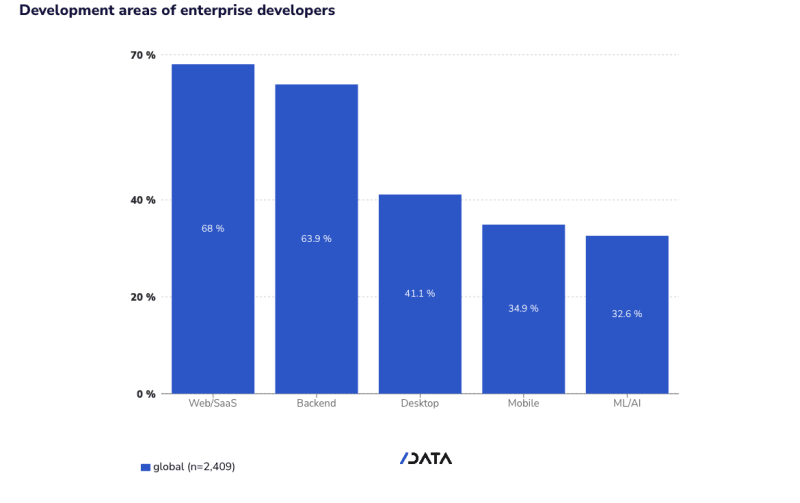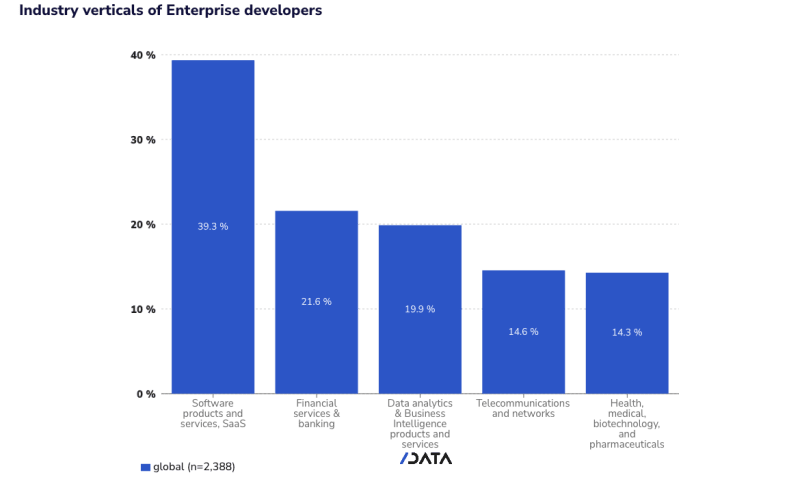For more content like this subscribe to the ShiftMag newsletter.
The ten biggest technology companies employ over 2.6 million people, according to the Fortune Global 500 list. Developer Nation data showed that at least 18% of software developers currently work for companies with 501-5,000 employees, which often falls in the category of Enterprise Developers.
Enterprise developers are responsible for creating and maintaining the software that powers businesses, organizations, and everyday life. Developer Nation interviewed a few enterprise developers from different verticals to learn more about their work priorities.
A third of all enterprise developers work in the US
When it comes to enterprise development, North America and Western Europe reign supreme. The United States alone boasts over 31% of the global enterprise developer workforce , followed closely by Western Europe with over 28.6%. However, Israel, despite its smaller size, punches above its weight with a significant concentration of enterprise developers, accounting for around 9.5% of the global total.
If we break down the enterprise populations by region, we find that 22% of software developers in South Asia are very large enterprise developers.
These enterprises are likely using their global connections to capitalize on price here: the median per-hour cost for Android development in India, a large hub for app development, is $30. In North America, the rate is five times as high. For example, SAP — the largest non-American software company by revenue — has based its largest R&D lab outside Germany, in India.
Enterprise developers are mostly backend developers
SaaS (web) development is a particularly popular area for enterprise developers. Over 68% of enterprise developers are involved in SaaS web development.
Besides web apps, enterprise developers are dominated by their involvement in the backend sector: 64% of enterprise developers are backend developers. Enterprise businesses typically have more sophisticated needs that warrant engaging backend developers. With the myriad of resources at their disposal, enterprises are more easily able to develop large-scale, connected products with complicated backends — IoT devices, for example.
Desktop apps also have a significant presence, with over 41% of enterprise developers working on each. While the involvement drops in the mobile sector compared to the first three. Just under 35% are involved in mobile. The relatively short scope and scale of mobile app development makes small business engagement in this sector achievable.
For enterprise companies, a mobile app, or a web app, is only one small part of a giant machine of software; but for smaller organisations, the mobile or web app might be the entire product.
Artificial intelligence is a growing trend, with around 33% of enterprise developers working on AI-related projects.
Industries: SaaS, fintech, data analytics…
The majority of enterprise developers work in the Software-as-a-Service (SaaS) industry. Financial services and banking have seen a huge increase in the last year or so, with over 21% of enterprise developers working in this vertical.
Data analytics and business intelligence products and services are also major industries for enterprise developers. Almost 20% of enterprise developers work in these sectors. The remaining enterprise developers are spread across a variety of industries, including telecommunications, health, pharma, education, retail, and manufacturing.
The 26th, Global Developer Nation Survey is live, open to all developers. Your insights and experience will shape the developer landscape and help tech companies improve the tools you are using every day.
Take the survey now and leave your footprint in shaping the industry of tomorrow!
The post Enterprise developers: what they do, where, and how appeared first on ShiftMag.









Top comments (0)